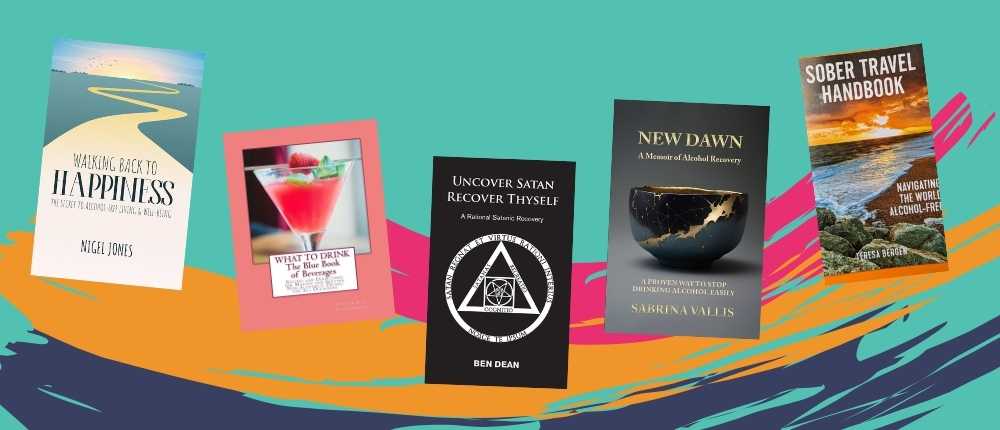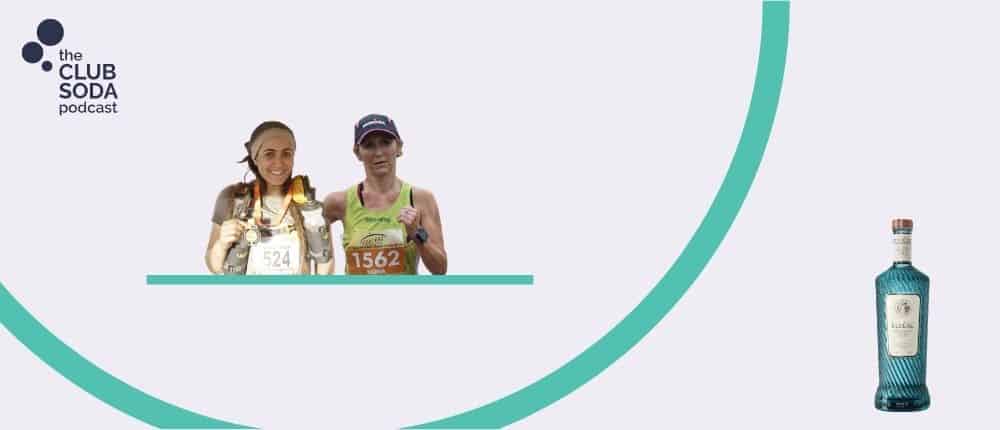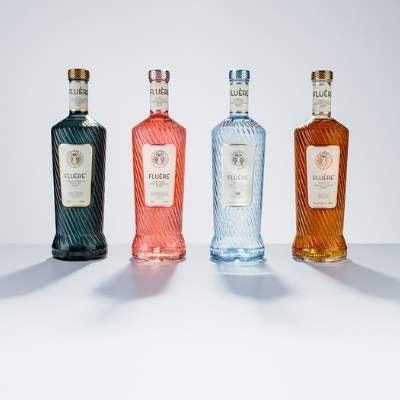
This website uses cookies to improve your experience. We'll assume you're ok with this, but you can opt-out if you wish. Read More
The Next Round: What happens after you change your drinking?

Many folk join Club Soda to change their drinking as part of an ambition to improve their fitness. If you become active or are trying to lose some weight, it can quickly become apparent that your drinking habits may need to change in order to facilitate this active version of yourself. In this week’s podcast, our founder Laura is in conversation with our Content Editor Anja, and journalist Fiona Bugler. Fiona has written extensively about health and fitness. In this podcast episode we explore how the two intertwine, and the parallels we can find between training our bodies for fitness, and changing our drinking behaviour.

February’s podcasts are in partnership with Fluère, an alcohol-free spirit from the Netherlands made for mixing. It comes in four editions. Original, Amber, Pink and Agave. Something for every taste; floral, spiced, raspberry or smoked. They are offering 15% off with the code ‘lovefluere’ on their shop website. Follow them on social media for cocktail tricks & tips!
Who are Fiona and Anja?
Fiona Bugler is a journalist and has written extensively about health and fitness. She has also been a fitness instructor and coach. During lockdown she launched a business called i-wellbeing, of which she is editorial director. The company publishes bespoke wellbeing content for proactive businesses. Fiona and her team help businesses shape their wellbeing narrative, via their bespoke print publication, The Zone, an online interactive platform, and wellbeing podcast. They also work one-to-one with marketing and HR teams to help them craft their wellbeing messaging. Fiona is an Iron Man triathlete and has taken on a number of challenges, from London Marathon to running across The Himalayas.
Anja Madhvani is the Content Editor here at Club Soda. She has worked in the beer and hospitality industry for 13 years, and is also the Brand Ambassador for Cloudwater Soda. Anja moderates her drinking, taking regular periods of abstinence. Anja took on the Marathon Des Sables in 2018, a 7 day self sufficient ultra marathon across the Sahara Dessert. She completed it with undiagnosed pulmonary tuberculosis (you can read more about Anja’s tuberculosis here). Her fitness journey has been a bumpy one since this, but she’s bagged herself a ballot spot for London Marathon, so it’s a great time to have opportunity to be in conversation with a fitness expert like Fiona!
when I was in my 20s my friend and I used to go to a fitness class at Jubilee Hall in Covent Garden and then go to the pub straight after. When I hit the end of my 20s I had my children and I was smoking and wanted to stop. Those two things combined, mainly having my children, made me realise I wasn’t able to go out and do all that partying. Fitness filled the space, I think. And the big change was getting a place at the London Marathon. If you get a place then you have to do something.
I think it really helps to have a goal, but with marathon training or any kind of goal, you have to be realistic. At first that goal might just be ‘I’m going to train every week’. That consistency is the key to success in running and other challenges. Once you build that success of knowing you can consistently get yourself out for a run you gain some confidence from that. Other goals feel easier to to do as well. It’s small exciting steps. It took me a long time to make the decision to commit to stop smoking and running replaced smoking. For me that worked, finding something to fill the gap. Be really careful not to apply the negative mindset to your challenges. Don’t beat yourself up if you’re not perfect, you have to be good to yourself.
Give yourself fewer opportunities to get out of whatever it is you’re trying to do. If you arrange to meet someone, it’s much harder to get out of going for the run. If you don’t show up then they’re going to stand in the freezing cold, so you’ve got to get up and go do it. Take out the things that could get in the way of you achieving. In the case of drinking, maybe that starts by making sure you just don’t buy that bottle of wine in the shop. Make it easier for yourself to make those small decisions, and take each decision as it comes.
Fiona Bugler
I’m quite bad at being nice to myself, I have a tendency to motivate myself with tough love which doesn’t always help. I was really unhappy and that unhappiness was translating into drinking more than I wanted to. I wasn’t being who I wanted to be. I chose a fitness goal that felt impossible for the person who I was then to achieve, I signed up for the Marathon Des Sables. I knew that there would have to be this process of personal growth in order to do it. I told people what I was going to do to create some accountability. The reward came really quickly, I was lucky because I found it quite easy to get going. Once I started training I found that the drinking cut down naturally. I started to enjoy the fact that I was moving my body regularly. That in itself felt like a reward.
I just got a place on the ballot for London Marathon this year. I’ve been entering the ballot for about five years. My fitness over the last couple years has been really up and down. I’m quite excited about it because it gives me something to focus on and to actually plan for. I find if you’re running and working on your fitness, but you’re not setting goals to work towards it’s easy to be very inconsistent. I’m actually feeling very excited about the work I’m going have to do to get myself there this year.
Anja Madhvani
I was thinking about giving up smoking for quite a long time and stopped and started giving up for about five years. When I finally gave up, I just gave up, and it was having the marathon place that did it. I stubbed out a cigarette on New Year’s Eve. I’d already done about a month’s worth of fitness training, but the longest I’d run was about 45 minutes. I started to build it up. I felt that I got extra benefits from running because I’d stopped smoking. I was coughing like crazy but getting better and better at running without cigarettes. I got the added boost, I think.
It’s about noticing what you’re getting from doing things. Sometimes you don’t see it, maybe you do a 20 minute run and think that hasn’t made a difference to your life. But if you tune in, you know it makes you feel good. Don’t take it for granted. Make a mental checklist of the benefits of the little steps you made.
Fiona Bugler
The last couple of years of exercise have been very hit and miss for me. I’ve struggled to be consistent and motivated. I’m working with a personal trainer at the moment which is great. It’s really gradual and reminds me a lot of what we do at Club Soda. We’re working around identity and mindset, exploring how I relate to food and my body, putting aesthetic concerns to one side and focussing on the enjoyment of it. I feel like what I’m starting at the moment is something that feels like a genuinely sustainable lifestyle change, which I’m enjoying.
Anja Madhvani
It’s easier to go out and exercise if you haven’t got a hangover and your body definitely feels the benefits. If you’re exercising alongside giving up you usually begin to see progress quite quickly. I always remind myself that I’ve never regretted a run. Despite my despite my protestations at the beginning, I find myself smiling when I’m out running along.
Laura Willoughby
I’ve taken on some big challenges, like running across the Himalayas. It’s all about mindset. Break it down into small pieces. When you least feel like going for a run, challenge yourself to just get out the door. But it’s also about not judging yourself. If I don’t get out for a run, I try not to say ‘God, I’m so useless!’. Remember you’re going to feel better once you’ve done it. In relation to giving up drinking or smoking, there will be those moments where the urge to not to run and have a drink or a cigarette can be overpowering. But if you just sit with it and let it flow over you it goes. Then you can take the next step. The good thing about running is it’s such a metaphor for living in life. You literally take that next step, and the next step, and the next step, and you’re moving forward. Keep the finish line in mind.
Fiona Bugler
When you take on a big challenge there’s an element of flexing willpower that I found really useful. I started to implement that in other parts of my life. If I was having quite a sluggish morning and thinking ‘I don’t want to go out for my run’ or ‘I don’t want to do my weight session’ or whatever, I would force myself to have a quick cold shower and crack on. I was getting comfortable with being uncomfortable, and taking ownership of that. I applied it to small things, if I couldn’t be bothered to empty the washing machine I’d start counting down from 10 and make sure I started before I reach 1. I knew that if I couldn’t do the little things that I didn’t want to do, then I wouldn’t be able to finish running across the desert. There was a balance of being a bit cruel to myself and being kind to myself.
Anja Madhvani
It’s the same with changing your drinking. It’s about visualising where you want to be, that life that you want to see yourself in. you do have to ride out that discomfort because your internal monologue definitely says things like ‘just have a drink. And you need to just accept that that’s a thought, not an action. It’s not a command. The reason I don’t want to drink again, after eight and a half years is because I don’t want to go through that first bit again. There’s nothing that life isn’t giving me now that alcohol could. So why would I want to have a drink and then have to go through that process of stopping again.
Laura Willoughby
I try to focus on what I stand to gain from the thing that I’m doing. When I was doing MDS, I did try to quit on the long day. It was double marathon day, I knew I would have to continue through the night. I was, unbeknownst to myself very ill with TB, I was coughing a lot, I was in a lot of pain in my chest. A strap on my bag broke, I was too hot, it was hell. I said to one of the race organisers ‘I’m done. I’m not having a good time. I want to go home’. I had the most amazing pep talk of my life, which I keep at the front of my mind now. He said to me ‘the moment that you’re in right now is the difference between can’t and won’t. You are capable of doing this but you are choosing that you don’t want. If I pull you out of this race now, you’ll feel great relief for about 20 minutes, then you will slump and you will feel awful for a very long time’. He was right, and I kept going. I like to remind myself that even when it’s really, really tough, I know that if I push through to get closer to where I want to be, I’m going to get to feel that little bit of euphoria. That’s one of the most rewarding feelings you can have.
Anja Madhvani
A great book to read on this is atomic habits, it’s about how to make these things stick. But it doesn’t mean it’s easy to do it just because you keep fit. I haven’t been doing any strength work and my flexibility is rubbish at the moment. I did a session the other night. And I thought ‘oh my god, this is what happens when you don’t do it enough’. So I’ve just got to get back into this and just do just a little bit each day. Otherwise, I’m going to turn into a ninety year old running with my back stooped over, I won’t enjoy that experience as much. You need to constantly remind yourself why you are doing it. It doesn’t just happen in a day.
Fiona Bugler
Longevity is a big motivator for me. After getting home from Marathon Des Sables and being very ill, and having a year where I was really pretty incapable of doing anything, it really struck me that my body isn’t invincible. If I want to enjoy comfort in my physical body in future, I need to pay attention to that and and work on it. It doesn’t mean you have to be running many marathons a year, it just means that you need to think about your mobility and how you’re using your body and how you’re fuelling it. You can enjoy your life more, even if you don’t have goals to be an athlete It’s just about physical comfort.
Anja Madhvani
There’s so much societal pressure around looking good, that often our desire for fitness is about attractiveness. But there’s a bigger goal there which is about how you move through life as you get older as a human being. Having a focus on that might take the pressure off around the aesthetics and give you more freedom to think about what type of movement you enjoy. There are many ways to do to do that. It can be lots of things and it doesn’t have to be the same thing next year as you’ve been doing this year either. You know, next year it could be kayaking or something else but it’s about discovering things as well.
Laura Willoughby
Start to think of exercise as your way of keeping mentally healthy, forget the physical because that just comes. In January I did the Red January challenge and pledged to get outside every day. Despite what people think I don’t actually always get outside every day. Having a goal to get outside every day meant I did it. I’m like a dog that needs to go for a walk, I have to get outside. If I don’t it really affects my mood. We’re human beings on this planet with these bodies, sitting in a chair, not doing anything is bound to not work well for us. We need to move. That doesn’t mean to say you have to be an athlete. Make a mental checklist of the benefits of the little steps you made.
Fiona Bugler
This website uses cookies to improve your experience. We'll assume you're ok with this, but you can opt-out if you wish. Read More
| Name | Domain | Purpose | Expiry | Type |
|---|---|---|---|---|
| wpl_user_preference | joinclubsoda.com | WP GDPR Cookie Consent Preferences. | 1 year | HTTP |
| PHPSESSID | www.tickettailor.com | PHP generic session cookie. | 55 years | HTTP |
| AWSALB | www.tickettailor.com | Amazon Web Services Load Balancer cookie. | 7 days | HTTP |
| YSC | youtube.com | YouTube session cookie. | 55 years | HTTP |
| Name | Domain | Purpose | Expiry | Type |
|---|---|---|---|---|
| VISITOR_INFO1_LIVE | youtube.com | YouTube cookie. | 6 months | HTTP |
| Name | Domain | Purpose | Expiry | Type |
|---|---|---|---|---|
| _ga | joinclubsoda.com | Google Universal Analytics long-time unique user tracking identifier. | 2 years | HTTP |
| sbjs_migrations | joinclubsoda.com | Sourcebuster tracking cookie | 55 years | HTTP |
| sbjs_current_add | joinclubsoda.com | Sourcebuster tracking cookie | 55 years | HTTP |
| sbjs_first_add | joinclubsoda.com | Sourcebuster tracking cookie | 55 years | HTTP |
| sbjs_current | joinclubsoda.com | Sourcebuster tracking cookie | 55 years | HTTP |
| sbjs_first | joinclubsoda.com | Sourcebuster tracking cookie | 55 years | HTTP |
| sbjs_udata | joinclubsoda.com | Sourcebuster tracking cookie | 55 years | HTTP |
| sbjs_session | joinclubsoda.com | SourceBuster Tracking session | Session | HTTP |
| Name | Domain | Purpose | Expiry | Type |
|---|---|---|---|---|
| mailchimp_landing_site | joinclubsoda.com | Mailchimp functional cookie | 28 days | HTTP |
| __cf_bm | tickettailor.com | Generic CloudFlare functional cookie. | Session | HTTP |
| NID | google.com | Google unique id for preferences. | 6 months | HTTP |
| Name | Domain | Purpose | Expiry | Type |
|---|---|---|---|---|
| _ga_10XZMT03ZM | joinclubsoda.com | --- | 2 years | --- |
| AWSALBCORS | www.tickettailor.com | --- | 7 days | --- |
| cf_clearance | tickettailor.com | --- | 1 year | --- |
| VISITOR_PRIVACY_METADATA | youtube.com | --- | 6 months | --- |
Join Club Soda for 10% off your first order of drinks for UK delivery. Plus get our latest news and special offers for members to choose better drinks, change your drinking and connect with others.
If you get an error message with this form, you can also sign up at eepurl.com/dl5hPn